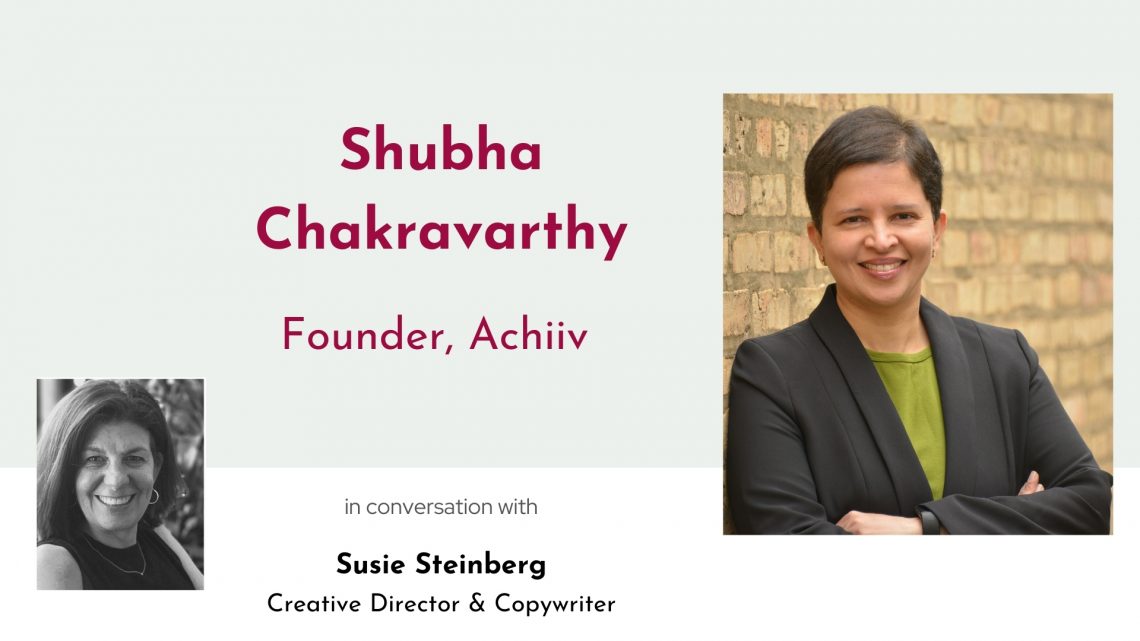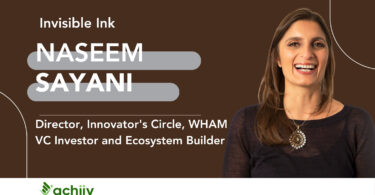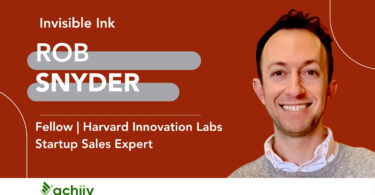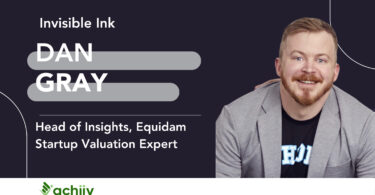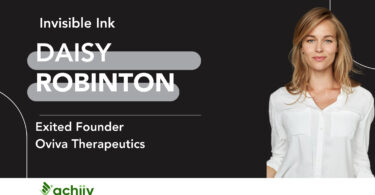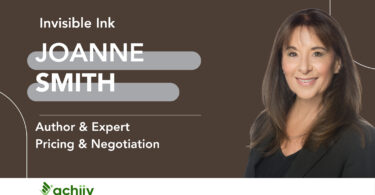About
Shubha Chakravarthy is the founder of Achiiv, a financial enablement platform for underrepresented female entrepreneurs. Achiiv is dedicated to providing under-represented women entrepreneurs the financial preparedness and confidence they need to transform their business vision into thriving success through the intelligent use of finance.
Shubha pivoted to entrepreneurship after twenty years in banking and financial services, to solve the problem of unequal financial access for ambitious women entrepreneurs.
Susie Steinberg is a leaned-in advertising copywriter, creative director and leader. She built her career in Chicago at DDB, McGarryBowen and BoomAgers Chicago/New York. She is a self-proclaimed punctuation geek, and a networker extraordinaire. She currently runs her own freelance consulting firm.
Summary
Shubha grew up in a conservative family in India, and moved to the United States in her twenties. After following “the program” of better education and a steady corporate job, she realized she’d never feel fulfilled if she didn’t go all out on addressing the burning issue of economic inequality most women face.
In this episode, Susan Steinberg talks to Shubha about growing up being seen but not heard, how to live with impostor syndrome, the 2 AM test for entrepreneurship readiness, the hardest entrepreneurial lesson she had to learn, and her secret “evil plan” for the podcast.
Episode highlights
- Leaving a comfortable corporate career to become an entrepreneur
- The biggest challenges of becoming an entrepreneur
- Finding your way early on with no help or connections
- Impostor Syndrome and how to deal with it
- The challenges of starting over in a new field
- How to fight the stereotypes about entrepreneurs
- The biggest skill gaps and how to bridge them
- The authentic way to build a network
- The biggest fears, and the fail-proof test for whether to go on
- The vision for Invisible Ink, and the secret “evil plan” behind it.
Links & Resources
Achiiv – Financial enablement platform for female entrepreneurs
1871 – Chicago based incubator and founder support community
Invisible Ink – Signup for podcast
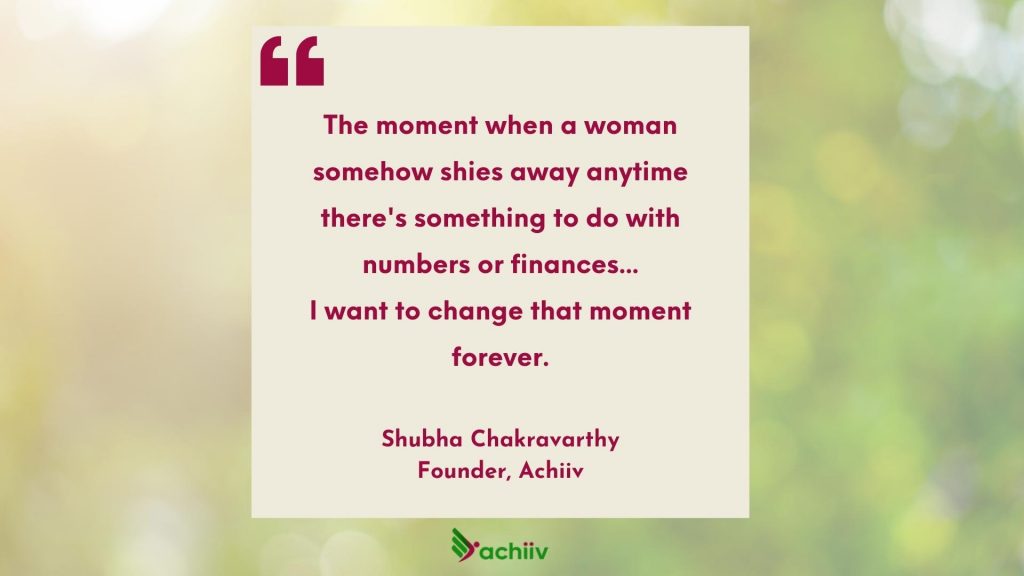
Interview transcript:
Susie Steinberg: So, you ready? Are you ready to turn the tables and be in the hot seat for a little while on this podcast?
Shubha Chakravarthy: Absolutely. Let’s go.
Susie Steinberg: Tell us a little bit more about you. What’s your background?
Shubha Chakravarthy: I grew up in India. I came here after I finished my education. I’m an ex-banker and an accountant. I’ve done consulting and about three or four years ago, I realized that I wanted to do something that was closer to my heart, that better married my head and heart.
So, here I am.
Susie Steinberg: So, what led to the idea of becoming an entrepreneur and when you made this decision, what did you think about it at the time?
Shubha Chakravarthy: I think I’ve always had an entrepreneurial streak in me ever since I was a kid. I grew up in a fairly conservative, very traditional South Indian family, where you grew up to become an engineer or a doctor, or if you’re a girl, then you became an accountant.
So, that’s what I did.
But throughout, there’s always been this streak of trying to do different things, trying to find better solutions to problems, as well as the streak around somehow helping women achieve greater economic equality. That has been a continuing theme in everything that I’ve been doing.
At some point, I had to just go out and do this thing, or I felt I would regret it throughout my life. So that’s when I decided to take the plunge. I left a fairly comfortable corporate career, because I wanted to do something that would help women and especially women entrepreneurs. I felt that if I didn’t do it then I’d regret it for the rest of my life and here we are!
Susie Steinberg: So, reveal – what is the big idea?
Shubha Chakravarthy: My idea was initially to help women do better with their personal finances. About a year or so ago, I was talking to a former colleague from banking about an idea to help their bank customers, the women customers get a better handle and more easily understand their personal financial situation. She said, “Shubha, this is great, but I really wish you would do this for entrepreneurs because we really want to help women entrepreneurs”, and that’s when the light bulb went on.
Even though I’d been in financial services all my life, and I was an entrepreneur, and I was facing these challenges, I’d never stopped to think about it. So, my idea was to figure out how to equalize the playing field and how to better equip women entrepreneurs to tackle the financial side of their business with greater confidence, with greater competence, while doing everything we could to make the industry more receptive, more inclusive, and more encouraging of women entrepreneurs.
Susie Steinberg: What were some of the challenges you wrestled with early in the process and how did you work through them? How did you find your way?
Shubha Chakravarthy: That’s a great question. I would say I’m still finding my way.
Some of the biggest challenges were – I didn’t know where to start. So, a big challenge was just the internal hurdle of, — do I have it in me? Do I have the skills to be an entrepreneur?
The secondary challenge was, — how do I take that and cross the bridge to making it a viable business idea without losing the heart of the mission?
The next big challenge is always what entrepreneurs called the product-market fit. What’s the very, very specific problem that you are trying to solve and what is the specific business model that will solve that problem that they’re willing to essentially jump on and say, “I’m happy to pay for that”.
I would say that I’ve not completed that journey yet in all honesty and it’s part of the reason I’m doing this podcast. What I’ve learned through that process is you have to take it slow, and you have to first go and listen to people who are eventually going to buy your product.
Susie Steinberg: So, you’ve touched a lot on growing up in India and coming from a somewhat traditional Indian family.
What are the general perceptions about women becoming entrepreneurs? How did it play out specifically for you and how you have you handled it and how, if at all, has it even impacted your entrepreneurial journey?
Shubha Chakravarthy: I grew up in a very conservative South Indian family where it was all about engineering and performance and so forth. The holy grail was – you did extremely well in school, you got a job, you did that job well, you got promoted, you married, you had kids – and for women, it’s all about being seen. At least when I was growing up, it was all about being seen and not being heard. So, that continues to be a challenge.
I don’t have anybody in the family who has done it before, so I can ask them – Hey, Uncle X or Aunt Y, what do I do about XYZ? So, it’s kind of like a mental trick you have to perform and that’s what keeps you going and takes your focus away from yourself and onto the problem and helps you get there faster, better, and so forth.
Susie Steinberg: What were your inner beliefs that you had either about yourself or what it means to be an entrepreneur as you were heading into this journey and what kind of challenges did that pose for you and how did you resolve them?
Shubha Chakravarthy: I think the answer is very simple. It’s two words – Imposter Syndrome.
I now know the name for it, but I always had this feeling, especially when you come to a new country where you don’t know anything, you’re starting over from scratch. You’re always questioning yourself and you say, do I really belong here?
That happened when I got into business school, I went to the University of Chicago Booth and for the first couple of quarters, I was convinced that it was an admission mistake and that somebody would walk into class one day, like in the middle of accounting or whatever and say, “Can I have Ms. Chakravarthy, please? We you need to see you outside.” Then they would take me out of class and the professor would be looking on and they’d be like, “We’re really sorry, Miss, but your admission was a mistake and I’m afraid we’re going to have to withdraw it and you’ll just have to go find a different school.”
So, I think the only thing that has changed over time is that I’ve become used to it and if I don’t have that feeling, it’s almost like you’re not doing the right thing. So that’s what gives me the hope and the strength to say – okay, maybe this will also become one of those challenges. When I look back and say, I got over it. But on the other hand, this could be the one that finally does me in and you just have to live with it.
Susie Steinberg: I’m going to ask you a question, unpack that for a minute. What made you think that you were not worthy or qualified, what was that inner voice?
What made you doubt yourself? What was that tape like in your head?
Shubha Chakravarthy: It’s the simple things, like what image does the word, ‘Entrepreneur’ conjure up in your mind? When I say the word entrepreneur, and if I were to do the psychological word association test, I see images flashing in my mind of people like Elon Musk, Mark Zuckerberg.
So, first of all, there’s no woman there that comes naturally. So, then the question is, who the hell do you think you are to break that mold?
And then secondly, all the things that they talk about, there’s a celebrity culture of glorifying entrepreneurs, rightfully so, many of them have overcome significant barriers.
But when you look at that and they talk about all the things they’ve done – Oh, I just went to an incubator, and I did XYZ, or I talked to a bunch of my friends, and we all sat around in a café, and we figured it out in the back of a napkin.
I don’t have any of those things. I look around and say, I can’t do that. I don’t see a lot of people like me at a great place like Y Combinator, maybe that’s changing, but at least you have this perception.
So, if you have this checklist of things you unconsciously build-up, of what it takes to be a successful entrepreneur, typically you’re looking at a list of things that apply much more to male white entrepreneurs than they do to someone like you and then add in the fact that you’re a mom and you’re not exactly 24 years old, then the doubts start to become really loud and everything else kind of gets drowned out in that.
Susie Steinberg: Do you feel that you’ve come to peace with that? That you’ve resolved it, that you’ve moved past it?
Shubha Chakravarthy: I don’t think you ever do.
I think you come to a point where you say, you know what, it doesn’t matter if I fail or succeed. The problem is so important that I’m going to give it a shot and I can’t rest knowing that I didn’t give it a shot. You just come to a point where you accept that failure or success are not as important has having given it a shot.
And as long as you don’t destroy yourself and your family financially, that’s the right place for me to be. So, I’ve just taken the whole concept away and I said, it’s all about the problem. Let’s just keep it focused on that.
Susie Steinberg: Tell us about the people who helped you along the way. Who were they, where and how did you find them? And then what were some of the surprises you faced?
Shubha Chakravarthy: I’ve been extraordinarily lucky in having really good friends from the get-go, right from my days in India, I’m still in touch with my first boss and he’s my valued mentor in many ways.
I had this unconscious desire of somehow connecting with people and learning things from them that I didn’t know. So, you kind of build this network and then when I started this entrepreneurial venture, I realized that everything was basically zero. All my network had to do with my corporate life about banking, risk management, whatever the case might be.
So, I had to go back to being a baby, so to speak, and replicate the same process and in the first couple of years, both the field, and the fact that you’re an entrepreneur are new. So, you’re like a two-time new person where you don’t know anything about two big things.
The first two years were hard, in that – you just have to kiss a lot of frogs. You have to meet a lot of people and then suddenly when you least expected somebody who you think is not really going to be helpful, turns around and becomes a most valued introduction to other people, or they go way out of their way and help you out with things that you would have never expected.
Classic case in point, I was introduced through a friend of a friend of a friend to a founder — to a lady who had founded a company very successfully. She gave me exactly 30 minutes. She didn’t know who I was; she didn’t know anything. She just did it because her friend had introduced me and in that 30 minutes, this was just recently, she completely turned around my approach and helped me see why the way I was going ahead with the product-first approach was not going to work. Of course, I resisted it. I was like, no, no, no, that doesn’t work for me, but she just kept persisting.
It’s very humbling and I think that humility is very important because it keeps you very aware that you cannot know everything there is to know about this problem, because otherwise somebody would have solved it already.
The other thing is I’m just open, like whether it’s your son’s friend’s parents or somebody you meet at a non-profit involvement, like I met you and, you’re so amazing. So, wherever it is, it’s keeping your antennae up and lastly, I would say most importantly, it’s knowing that things take time.
You cannot build relationships through, “Networking”. I tried to go in with an approach somebody taught me, one of my early mentors. He said, always go in, asking what can you do for somebody. So, if you have that as a default mentality, then it becomes natural and people kind of sense that, and then they become really generous in return.
So, those have been some of the things I’ve learned that work well for me.
Susie Steinberg: Is there anything that was like – you knew in your gut or intuitively that you already knew about being an entrepreneur? And if that is the case, where did you learn or discover that.
Shubha Chakravarthy: I think there’d be a couple of things that I instinctively knew. One is I tend to be fairly resourceful about solving problems, in the sense that I’m not looking to somebody else and saying, “So, has anybody solved this problem before? Where do I even start?” I start somewhere and I’m very scrappy that way.
So, it’s kind of bled into everything I do – it is I, I just kind of start hacking stuff. So, I knew I had that going for me and then second, I never got used to the corporate culture where you have somebody taking care of everything for you, whether that’s fixing your printer or, knowing how to do all the billion things you need to learn how to do as an entrepreneur.
So, I never got used to having, executive assistants or whatever. I always have this feeling that eventually I’d have to rely on myself, that came in handy. I’d say the third piece is, I’m a very big learner. I love learning about new things. So, I’m constantly reading books or listening to people or trying something or the other.
So, those are the three things that I knew were my strengths and I just had to lean very heavily on those until I started getting some of the other more natural entrepreneurial strengths that I could rely on.
Susie Steinberg: What would you say were your knowledge and your skill gaps going into this and how did you deal with them?
Shubha Chakravarthy: So, my two biggest skill gaps were – number one, there is a method to entrepreneurship. If you’re familiar, there’s a book called “The Lean Start-up”, but that’s not the only one. It’s become almost a religion in Silicon Valley, where if you do a start-up, then you go about a certain way.
So, finding the right entrepreneurial method to your product and to your market was my number one biggest skill gap and it took me almost three or four years to try and fail at various methods. This is the hard part you don’t understand when you go in, each method has some invisible assumptions built in.
So, if you’re going down the lean start-up method, it assumes that you already have some amount of money to build a minimum viable product or things like that.
But if you’re funding yourself, which is the case for most women entrepreneurs I know, that may not be the best fit. So, to kind of understand all of that in reverse engineering to say, will it really work for me? And if not, what will? – was the biggest gap.
And now I’ve joined an incubator at 1871, which is a Chicago incubator and it’s suddenly like the flood gates opened. I cannot believe how many other people there are, who are like me in many ways and so, suddenly it’s become much easier to pick up those things almost unconsciously, that I was really struggling uphill in my first couple of years.
The second, knowledge gap I’d say is even though I’ve spent my entire life in finance, it’s been in a very specific corner of finance, which is retail, finance, lending, mortgage finance, maybe a lot of insurance as well.
So, the business side of entrepreneurial finance has been new. I was able to benefit because I already had – you have an understanding of what the building blocks of finance are. So, you can kind of jump on those and learn quickly. It’s a constant learning process and most importantly it is by talking to other experts in an informal way, like a 10-minute, 20-minute conversation and ask them a specific question to say – I need to know what a cap table is, or I need to know what a Series A-Round is – for example.
So, I would kind of take them in micro bites with whoever was willing to talk to me and as you listen to them talk, you unconsciously pick up a lot of things about the context, the culture, and how things are done, that you don’t even realize and then you suddenly look back and are like, I already knew that, but you can’t remember when you learned it.
So, those are two big things that I would say were my biggest skill gaps and I’m still very much on that learning path.
Susie Steinberg: So, to that end, what have been the toughest moments for you in this journey and how have you gotten through them?
Shubha Chakravarthy: The number one toughest moment? The toughest challenge, I would still say, it’s the case of not knowing how this is going to turn out.
There’s no book that says, and they lived happily ever after and when you have a kid and a family and you’ve kicked out perfectly good job, that was making a good income, there are many, many nights, more than I care to admit when I get up at two o’clock. It’s always two o’clock. I don’t know why that is, but I get up at two o’clock and, I wonder, what am I doing and am I doing a huge disservice to my family?
My husband is incredibly supportive, which helps a lot because otherwise I don’t think you could do it. It’s just making sure that you are discharging your financial responsibilities to your family — it is the number one toughest moment and number two is when your most cherished assumptions get shattered. I thought I knew what women entrepreneurs wanted. I’m not so sure anymore. I thought I wanted to be in the personal finance space, that turned out not to be the right answer for me – or the market.
So those are very humbling moments. And I think it’s a good lesson, you learn to be very, very modest, and very humble over time and to become somewhat shameless and the way I got through those is just to say, okay, would I do it any differently if I had to do it over again? Is this problem worth walking away from? And somehow it never is.
I’m determined to give it one more shot in the morning and see maybe this time it will work. In the first 18 to 20 months, it was all uphill and there were no green shoots of hope, so to speak, but of late, I’ve started to see a little bit more come out than I’m putting in and that’s a magical moment because suddenly everything feels not so hard anymore and then the momentum builds.
The hardest work happens away from the limelight, and you somehow had to dig deep into yourself to figure out how you keep going.
Susie Steinberg: What would you say is the most fulfilling thing about being an entrepreneur?
Shubha Chakravarthy: I have to say that of late it’s meeting other women entrepreneurs that I am looking to interview for my podcast. Just on Friday, I met an amazing woman as a precursor to interviewing her on my podcast.
Just the stories she brought to the table, almost moved me to tears. It was very fulfilling when she validated my view of the problem with regard to women and finance and entrepreneurship. So, that was very fulfilling.
But when she said, ”I wish this had been there when I was starting out, or this is what I really think is needed and I’m so happy you’re doing this.” To hear that is what keeps me going and will keep me going no matter how bad things get.
Susie Steinberg: So, that kind of leads to my next question, which I think you’ve probably already answered it, but what is the one thing that keeps you going on this journey?
Shubha Chakravarthy: It would be the moment when a woman walks in, or she sees a challenge which would have fazed her before and she would have said, “You know, I can do everything else about the business, but not the numbers.” When she somehow becomes smaller or shrinks anytime there’s something to do with numbers or finances.
I want to change that forever.
I want her to walk in and hold herself high, and if somebody asks her, “You need to walk through the financial models now, or we need to discuss any, insert your favorite piece of jargon from the financial services industry”, and she stands just a little bit taller and says, “Let me walk you through XYZ”, without any fear and with absolute confidence, that is the day I live for.
Susie Steinberg: If you had to start things over, if you were able to start things over, is there anything you would do differently?
Shubha Chakravarthy: This is so funny. I think I would start seeking a community sooner. That’s what everybody told me, and I resisted, and I said, that’s for other people, that’s for people who are younger. That’s for people who are smarter. That’s for people who have more money than me. It’s not for people like me.
And now that I’ve joined the incubator and I’m starting to mix with other entrepreneurs, I see how much of a waste of time that was and that said at the same time, I think it’s also hard to know where to go especially if you’re like me and not a traditional entrepreneur, 20 years old, single whatever the case might be.
I would say find somebody who you can talk to. Whether it’s joining a community or a meetup or a monthly coffee with, even if they’re not pure entrepreneurs, but if they have some streak in them that is entrepreneurial that you can lean on and build energy from — never give that up because that is such an accelerator. It’s like a 10 X booster to your energy and to your progress. I would just do that one thing differently.
Susie Steinberg: So, obviously the reason we’re here, you’re starting up this new podcast. So, what made you do that? What was the motivation?
Shubha Chakravarthy: Initially I went in with the same view that everybody else does, which is you understand the product, you understand the problem. Therefore, here’s what you think the answer is, and now build it and they will come and knowing that this was a trap, yet I fell into the exact same trap, not once, but three times and I did that, over the last six months. It didn’t work until this lady I told you about earlier, the entrepreneur, told me you’re getting it all wrong. You need to first go talk to your people. It’s hard to talk to people and she said, “Let me tell you how to do that”, because I’m an introvert. I don’t have a lot of friends who would meet the criteria of being entrepreneurs.
She said, “Start a podcast and talk to the people who you want to serve.” I was very resistant, of course. It’s just amazing how dense I can be sometimes. I was resistant, but then I started experimenting and I just talked to a couple of friendly people wouldn’t mind early missteps if I were to make that podcast.
As I started doing that, I realized how much more transformative for someone to listen to someone like themselves and share the learnings, the challenges, and all of that stuff. The reason I started doing it was because I was given this advice to say, do it and having run out of all other options I said, what do I have to lose? Let me do it and then as I started doing it, it was a huge energizer to connect with these women, to hear their stories. So, now I’m completely addicted to finding more women entrepreneurs and hearing their story and hopefully helping other women hear it and get inspired as well.
Susie Steinberg: Fantastic. So, my next question is, what has it been like?
Shubha Chakravarthy: It’s very hard. I think it’s easy to fall for the folklore of entrepreneurship. We only see entrepreneurs when they become successful.
I’ll talk about women, you know, Sara Blakely or Oprah Winfrey. Yes, you intellectually understand that they’ve been through a lot of hard work. But it’s hard to understand at a visceral level. What that means to me, what it has meant is ****to see my other colleagues and peers really hitting it out of the park in their corporate careers and when people ask you, what are you doing , you don’t really have anything to tell them because you’re still not sure what you’re doing. That part is hard.
It’s been hard, but that 2:00 AM test is what I, you know, I come back and say at 2:00 AM, when things are really rough, do you still keep going?
The answer to me is always yes, because the problem is so important, and I don’t see the kind of solutions that I want to see and the kind of help that needs to be given to women around financial preparedness, not just funding, that it keeps me going. So, it’s a lot of high-highs and even more low-lows.
But at the end of the day, when I asked myself, would I do anything different? The answer is no. So, that’s more than enough for me, succeed ****or fail. I don’t care. I just want to make the biggest impact I can on this problem.
Susie Steinberg: What is one thing you’d like to do with the podcast?
What dent, this is heavy, what dent would you like to make on the universe with it?
Shubha Chakravarthy: Can I tell you my secret evil design for the world?
Susie Steinberg: Please.
Shubha Chakravarthy: My secret evil design for this podcast is to make it so that it becomes an MBA in disguise for every woman, so that when she is driving, dropping off her kids, doing chores at home or doing the laundry, she’s just listening to stories – whether they’re from other women entrepreneurs like herself or from experts who are not threatening, who may look and sound like her for a change, that she’s unconsciously understanding in a way that makes sense to her and that she can digest. All the concepts that you need, that she may not currently have access to and at the end of 52 episodes or whatever the case might be without realizing it, she feels that she’s already gotten an MBA.
So, the next time she walks into challenging business situation that would have fazed her in the past, she suddenly realizes ****that she knows the answers, and that was because she listened to all these episodes on the podcast.
That’s my evil plan for my podcast.
Susie Steinberg: Sounds like a great evil plan to me. It’s been fantastic chatting with you. Thank you.
Shubha Chakravarthy: Thank you, Susie for doing this. It’s always a pleasure to talk to you and together we will make a difference in the world! Thank you so much.

